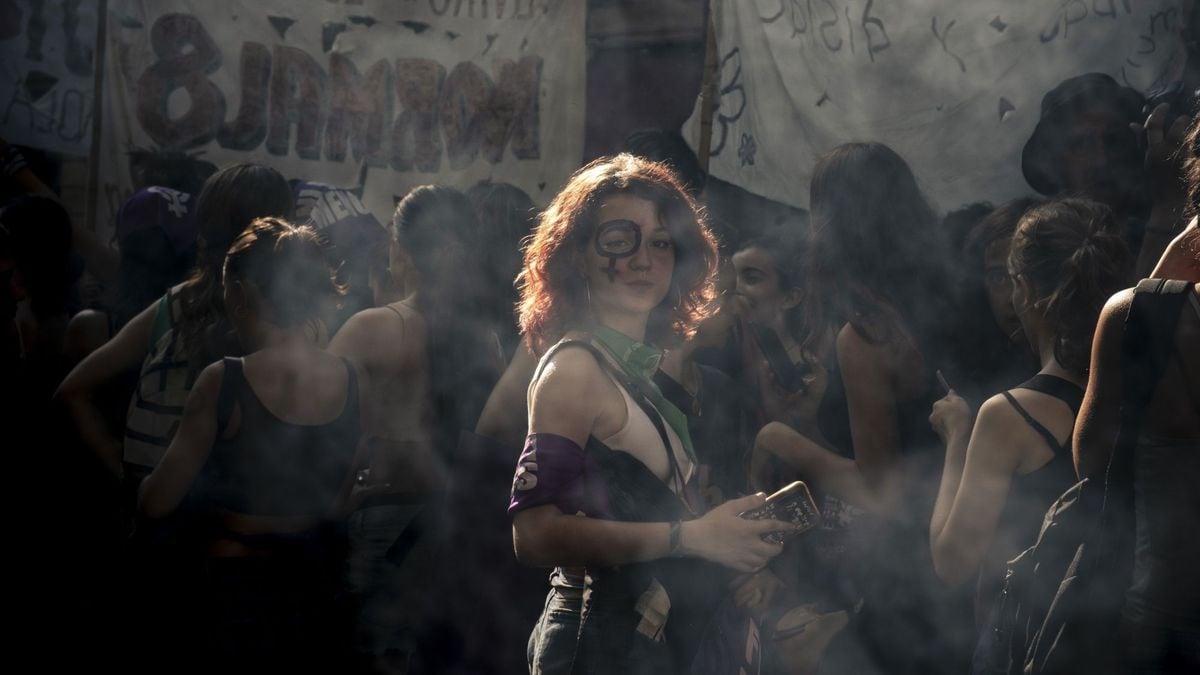The feminist movement flooded this Wednesday, March 8, the main cities of Latin America in a day of demands and fight for equality.
Millions of women from Mexico to Argentina, passing through Colombia or Chile, mobilized in massive marches in defense of their rights.
Some rulers took advantage of International Women's Day to make political announcements, such as Luiz Inácio Lula da Silva in Brazil, while internal division has marked the protests in Buenos Aires for the first time in years.
A green and purple tide swept through Mexico City to demand justice and all the demonstrations were crossed by a massive stop against violence.
In United States,
Political slogans in Argentina
Tens of thousands of women marched in Buenos Aires.
But unlike other years, they did it in several simultaneous calls, which showed the divisions that the movement faces.
The Ni Una Menos against femicides and the requests for the implementation of the abortion law remain the two great flags, but the organizations closest to Kirchnerism also included criticism of justice.
"With this justice there is no democracy", could be read on the main flag hung at the foot of the stage in front of the Argentine Congress.
Allegations that the vice president, Cristina Kirchner, suffers what they consider a ban since she was convicted of corruption last December.
The left, for its part,
A contingent with a sign that reads 'Not one less', during the march in Buenos Aires, this Wednesday. Erica Canepa (Bloomberg)
In an election year, political slogans were more present than in other years.
There was also room for the usual demands.
"Oe, oe, oe, oa, money for sexual education and for the priests to go to work", feminists sang at the gates of the Plaza de Mayo, criticizing the obstacles of some religious schools to the law that obliges them to teach comprehensive sexual education and denialist discourses of gender violence.
The battle for a legal, safe and free abortion law won in 2020, the famous green handkerchiefs wore a new slogan this year: “It is already law”.
The approval of the norm has been one of the milestones of the feminist mobilization in recent years.
MORE INFORMATION
This is how we have told you about the Women's Day marches in America
Releases in Brazil
The president of Brazil wanted to turn this March 8 into a great party.
Luiz Inácio Lula Da Silva surrounded himself with his eleven ministers (one third of the Cabinet) and his wife, Janja, to announce a package of measures aimed at women at the Planalto palace in Brasilia.
Among the announcements, they highlighted a law that requires equal pay between women and men, establishing March 14 as the national Marielle Franco day against political violence, credits for women, aid for research scientists or distribution of free tampax in outpatient clinics .
The president also mentioned two facts that measure the challenge in Brazil and in the world: every day, three Brazilians are murdered for being women.
And according to the UN, at the current rate, there are 300 years left to achieve gender equality.
Simultaneously, the Ministry of Foreign Affairs has announced that it will have a high representative for gender issues, the diplomat Vanesa Dolce de Faria.
Undoubtedly the most acclaimed in the act with Lula, the former president Dilma Rousseff, removed from power in a political process that had its doses of misogyny.
A group of women with posters during the march on March 8 in São Paulo.Isaac Fontana (EFE)
The most striking decision of 8-M has probably been that of the Supreme Court of Brazil.
He wanted to join this marked date with the release of 149 women who are in prison accused of participating in the coup acts in Brasilia.
The largest demonstrations by feminist organizations took place, as in previous years, in Sao Paulo and Rio de Janeiro.
Reforms in Chile
The Government of Gabriel Boric, the first Chilean to declare itself feminist, has commemorated International Women's Day by announcing initiatives to universalize access to childcare rooms in companies, reduce the cost of contraceptives and promote legal reforms in the area of public security that enshrine the right to a life free from violence.
In an act first thing in the morning in La Moneda, the president also highlighted that part of the funds raised with the tax reform would be used to reduce the pension gap between men and women, which reaches 40%.
However, hours later, Congress rejected the tax proposal, dealing a heavy blow to the leftist government program.
In the afternoon, thousands of women took to the streets in different parts of the country.
In Santiago, protesters gathered in the iconic Plaza Baquedano and marched along the capital's main artery, the Alameda.
With a calm and festive tone, the march mixed the demands of different generations and feminist groups.
To the cries of "No is no" and "Abortion yes, abortion no, that's what I decide", common to the struggles of women on the continent, other demands were added, such as those demanding responses to femicides or for the victims of the protests. recent policies or those that reminded those who disappeared during the dictatorship.
"Now, now, now they want life, when in the dictatorship they killed with the DINA" was the motto of another of the groups on the march.
With information from Mar Centenera, Antonia Laborde, Naiara Galarraga Gortázar, Elías Camhaji and María Antonia Sánchez-Vallejo.

